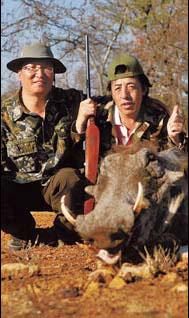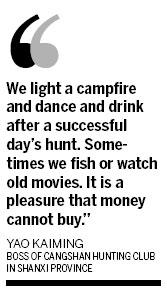BEIJING - Despite concerns over scenes of slaughter, wildlife hunting has become a craze among the wealthiest in China, a country that puts much value on Confucianism, a philosophy that values humanity and harmony.
 Niu Xuemin (right), 42, and John Wang, 45, an interpreter, with the former's prey, a warthog. Niu and fellow hunters paid 49,800 yuan each for the round trip, visa, food, drink and accommodation in a hunting lodge in Munnik, Limpopo province, in northern South Africa last month. [Photo/China]
Niu Xuemin (right), 42, and John Wang, 45, an interpreter, with the former's prey, a warthog. Niu and fellow hunters paid 49,800 yuan each for the round trip, visa, food, drink and accommodation in a hunting lodge in Munnik, Limpopo province, in northern South Africa last month. [Photo/China]Yao Kaiming, a 40-something businessman in engineering and property in Beijing, is one of the new enthusiasts. He owns the large CangShan Hunting Club in Shanxi province.
"China is a nation with a long history of hunting: There is culture and heritage here," said Yao. "Hunting actually embraces the theory of harmony and natural balance. In many countries, hunters stand at the frontline of animal protection."
As a senior hunter with nearly 30 years of experience, Yao and his friends have witnessed lots of misfortune suffered by local farmers in which overpopulated wild animals demolished their farmlands and ripening crops.
Nonetheless, he says his hobby is always met with alarm by wildlife conservation groups. He says he has tremendous difficulty explaining that hunting can help protect farmers' interests as well as the ecological balance if well-planned policies are instituted by the government.
However, his enthusiasm for the sport, which he has enjoyed since college days in 1983, remains undimmed. "At that time, hunting was just a very trendy activity for me to demonstrate my muscle," he said, his eyes gleaming. "I met my wife while hunting and she is also a very smart hunter."
Yao and his friends spend every winter lurking behind the forest undergrowth in sub-zero temperatures tracking their prey.
"Hunting is teamwork: Everyone has their own area of responsibility," said He Wei, a man in his 30s who is a team leader in Yao's club.
One senior hunter will travel to the hunting grounds and track the quarry by its footprints and excrement in advance, while another will stalk the prey and drive it to a mountain inlet where other hunters are waiting to shoot it, He explained. "We stay in touch using walkie-talkies."
Yao also owns an alcohol plant in Beijing where he produces a Chinese liquor branded "Old Head Hunter" to mark his hobby. "We light a campfire and dance and drink after a successful day's hunt. Sometimes we fish or watch old movies. It is a pleasure that money cannot buy," Yao said.
Yao's club is one of the largest in China. It has about 6,340 mu (423 hectares) of hunting land containing wild boars, pheasants, deer and some other animals that are authorized for legal hunting. The hunting season lasts from October to March, allowing time for the animals to breed.
Yao said hunting in China was still an industry in its infancy and that very few people knew about it - but it was profitable.

Yao's club signs up about 60 members a year. Any more, he said, would affect safety and service quality.
The membership fee at Yao's club is about 10,000 yuan ($1,499) a year. Yao said: "Of course, if you hunt more, you have to pay more. Killing a boar costs around 1,000 yuan."
"It is relatively cheap to hunt in China because the market is not large and hunting in China is actually not a luxury only designed for the wealthiest, despite what many people think," Yao said.
"However, if you are planning a hunting trip in South Africa, you need to put aside at least 100,000 yuan," Yao added.
He said the most popular overseas hunting venues included North America, South Africa and Australia.
There are about 200 hunting clubs across China. In Shanxi, where Yao's club is based, there are four professional clubs currently in existence.
"While, the average price for joining a club for one hunt in China is around 1,000 yuan, the annual revenue of our club can be as much as 400,000 to 500,000 yuan," he said.
According to a report by Reuters, another popular Chinese hunting club, Yuquan International Hunting Field, in Heilongjiang province, attracts more than 100,000 tourists a year on average. Many of them are hunters traveling thousands of miles to get their hands on a rifle or shotgun for the first time.
Jiang Zhigang, deputy director of China's Endangered Species Scientific Commission, previously told China Daily that money gained from hunting one animal is theoretically able to afford protection to 3,000 animals of the same species. Based on international hunting practices, hunting incomes are also able to subsidize local farmers and help to improve their living conditions.
Currently, there are only 14 wild animals that can be legally hunted in China, including boars, pheasants and deer, according to the National Forestry Administration.
Usually, local forestry administrations, wild animal protection departments, hunting grounds, together with the Department of Wildlife Conservation and Nature Reserve Management under the State Forestry Administration, jointly launch investigations into wildlife resources and allocate quotas to hunting organizations.
Every year, the club has to apply for quotas from the local government and they will be punished if they exceed the quotas.
In a bid to avoid any injuries and environmental damage during hunting, beginners are taught to recognize permitted prey and given lessons in wildlife environmental protection, personal safety and how to operate a gun.
They also have one or two days of shooting practice and have to pass a simple test before being granted a certificate by the hunting clubs and starting their quest.
In China, gun ownership is strictly controlled. Guns can only be owned by registered hunting clubs and can only be used within the clubs' hunting territory under the surveillance of the relevant government departments.
"My club owns over 20 guns, some of which are manufactured in China and some are imported from other countries," said Yao.
The exported guns are usually priced at more than 40,000 yuan. There are also 6,000 yuan or even cheaper domestic guns available. "It is a bit like how people dream of owning a Mercedes-Benz sports car: You will feel its (a quality gun's) value once you touch it," Yao added.
According to the hunter, more than 50 percent of hunters in his club are aged over 50. Hunting seems not to be very popular among younger Chinese. It might be because it requires patience and willpower and a willingness to brave the great outdoors. Computer games and clubbing are rather easier options, said Yao.





